Review of the past award years
The German Simulation And Gaming Award was presented for the first time in 2010 and has been awarded every two years since 2011. In the list, we provide a review of the corresponding competition years.
![[Translate to English:] Dr. Johannes Katsarov [Translate to English:] Dr. Johannes Katsarov](/zms/_processed_/4/1/csm_DPP23_Preistr%C3%A4ger_Johannes_Katsarov_1000x1000_f6f608314c.jpg)
![[Translate to English:] Marian Hummel [Translate to English:] Marian Hummel](/zms/_processed_/f/4/csm_DPP23_Preistr%C3%A4ger_Marian_Hummel_1000x1000_a85ae83348.jpg)
![[Translate to English:] Francien Baijanova [Translate to English:] Francien Baijanova](/zms/_processed_/0/b/csm_DPP23_Preistr%C3%A4ger_Francien_Baijanova_1000x1000_da8fbc5f0f.jpg)
![[Translate to English:] Jan Germes [Translate to English:] Jan Germes](/zms/_processed_/7/6/csm_DPP23_Preistr%C3%A4ger_Jan_Germes_1000x1000_7dacbed3f9.jpg)
Now in its eighth year, the ZMS and SAGSAGA awarded the German Simulation and Gaming Award. This prize honors innovative ideas from young academics in simulation game research and development. During the ceremony, the four winners received their prize packages from the interdisciplinary jury of experts. In addition to the prize money, this also includes a publication and free membership of SAGSAGA.
First place in the thesis category went to Marian Hummel for his master's thesis “Participation learning with online simulation games in political education. A pilot study on a digitalized municipal political simulation game with grade 8 students” at the Catholic University of Eichstätt-Ingolstadt. Francien Baijanova from Delft University of Technology was awarded second place for her master's thesis “Talk That Talk - The Evaluation and Redesign of a Persuasive Game for Tackling Sexual Violence Among Students in Dutch Universities”. Jan Germes was awarded third place. He wrote his master's thesis at the University of Duisburg-Essen on “Development and prototypical implementation of a simulation game on the topic of flood events in the training and further education of specialists” (3rd place).
This year's special prize for dissertations was awarded to Johannes Katsarov. He completed his doctorate at the University of Zurich on “VIRTUOUS PLAY Promoting Moral Sensitivity with Digital Games”. A total of eleven student theses and two dissertations were submitted. The theses came from a wide range of disciplines such as political science, economics, ethics, media, health management, psychology and others. This diversity has characterized the prize for years - interdisciplinarity is lived here.
Congratulations to the award winners and many thanks to all applicants and supporters of the DPP 2023!
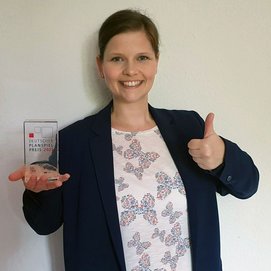
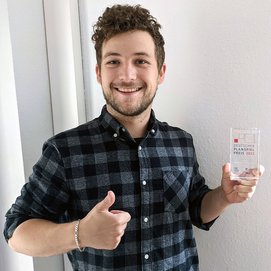
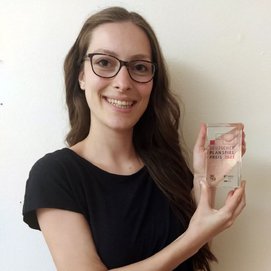
On 18 June 2021, the German Business Simulation Award 2021 was ceremoniously awarded at the 33rd European Business Simulation Forum in Stuttgart. In the seventh year of the competition, the prize went to three young academics: Matze Krebs from the PH Ludwigsburg received the first prize for his Master's thesis. Second place went to Theresa Störlein from JMU Würzburg for her admission thesis and the special prize was awarded to Dr. Maria Freese, who did her doctorate at KIT and DLR. Congratulations!
During the festive ceremony, the prize winners received their prize package from the interdisciplinary jury. In addition to the prize money, it also includes a publication opportunity and membership in the simulation game association SAGSAGA. Numerous simulation game companies have been supporting the prize for years and thus make a decisive contribution to the further development of the simulation game method.
This year, 13 applications were received, including three dissertations.
Congratulations to the prize winners! But the non-award-winning papers have also made an important contribution to the further development of the method and will in part be part of the volume of our ZMS publication series on the DPP 2021.
In this competition year, 15 theses and five dissertations were submitted. Over the six competitions that have now run, 124 papers have now been submitted - a proud number! This year, the works came from Germany, Austria and Switzerland, but also from Sweden. It is always exciting that the works come from very different fields, this year among others from environmental economics, social science and philosophy, sustainable economy, political education, educational science, political science, business education, business informatics, but also architecture and spatial planning and philology were represented.
The first prize in the category of theses was awarded to Friederike Welter. She wrote her thesis "City has play - Urban play as a contribution to the development of public space" at the Faculty of Architecture and Spatial Planning at the Vienna University of Technology.
Antonia Bartning received second place for her master's thesis at HNE Eberswalde. She wrote about the "Development of a game for the entertaining transfer of knowledge about the foundation of a sustainable company". In the meantime, by the way, this game has already been implemented ready for the market.
Third place went to Manuel Stamm from ETH Zurich, whose bachelor thesis dealt with the following topic: "Role-playing games as an educational tool - Adapting and evaluating the CoPalCam role-playing game on the issue of palm oil with secondary school students".
Thus, we have three prize winners from three countries and with three theses (bachelor, master and diploma thesis).
There were five entries in the special prize category for dissertations and postdoctoral theses. Dr. Jan Robert Lohmann, University of Passau, won with his work on "Simulations Matter - Impact and added value of policy simulations".
Congratulations to the winners and many thanks to all applicants and supporters of the DPP 2019!
1st Place, Category Theses
- Welter, Friederike (2018): Stadt hat Spiel - Das urbane Spiel als Beitrag zur Entwicklung von öffentlichem Raum. Wien: TU Wien (Diplomarbeit).
2nd Place, Category Theses
- Bartning, Antonia (2018): Entwicklung eines Spiels zur unterhaltsamen Vermittlung von Wissen über die Gründung eines nachhaltigen Unternehmens.Eberswalde: HNE Eberswalde (Masterarbeit).
3rd Place, Category Theses
- Stamm, Manuel (2017): Role-playing games as an educational tool.Adapting and evaluating the CoPalCam role-playing game on the issue of palm oil with secondary school students. Zürich: ETH Zürich (Bachelorarbeit).
Special Price for Dissertations and Postdoctoral theses
- Lohmann, Jan Robert (2019): Simulations Matter - Wirkungsweisen und Mehrwert von Politiksimulationen. Passau: Universität Passau (Dissertation).
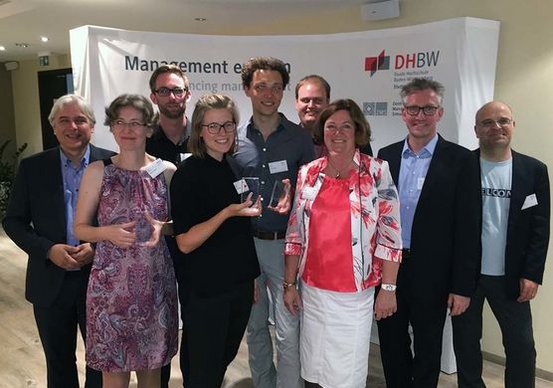
In this competition year, 20 theses and one dissertation were submitted for evaluation. The works came mainly from Germany, but also from Austria and, for the first time, from Scotland. Particularly pleasing was the wide range of disciplines from which the papers came: Computer Science, Education, Psychology, Political Science, Economics, Media Studies are just a few of them.
The first prize in the category of final theses was awarded to Linda Dowidat. She wrote her bachelor thesis "Development of a Motivation Framework for Competence Developing Games in Companies in the Area of IT Security Defenses" at the FH Aachen. This is the first time that a bachelor thesis has taken first place in this competition.
Bettina Schedler received second place. Her master's thesis at the Vorarlberg University of Applied Sciences had the "Development of a criteria catalog for the selection of project management simulation games." as the topic.
Third place went to Jasper Nikolaus Meya from the University of Bremen, whose master's thesis dealt with the following topic: "Cooperation and climate policy optimism. A quantitative-empirical investigation of the simulation game KEEP COOL on political education for sustainable development."
1st Place, Category Theses
- Dowidat, Linda (2015): "Entwicklung eines Motivationsframeworks für Competence Developing Games in Unternehmen im Bereich IT Security Defenses"
2nd Place, Category Theses
- Schedler, Bettina (2015): "Entwicklung eines Kriterienkatalogs zur Auswahl von Projektmanagement-Planspielen"
3rd Place, Category Theses
- Meya, Jasper Nikolaus (2015): "Kooperation und klimapolitischer Optimismus. Eine quantitativ-empirische Untersuchung des Planspiels KEEP COOL zur politischen Bildung für eine nachhaltige Entwicklung."
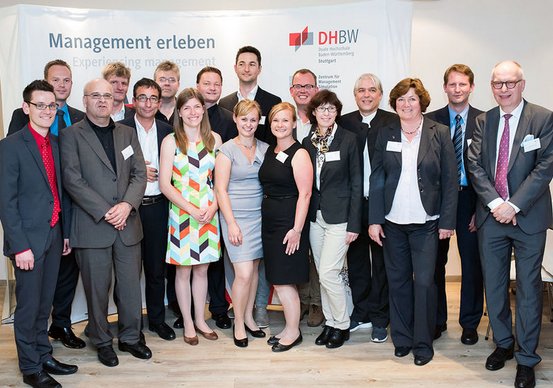
In this competition year, 13 theses and ten dissertations were submitted for evaluation. The high number of doctoral theses in particular surprised and delighted the organizers and the jury. In addition to Germany, the theses also came from the Netherlands, Poland, Sweden and Russia.
Janina Haupt and Nicole Jentsch received the first prize in the category of degree theses for their master's thesis "Possibilities of controlling and evaluating learning processes and results when learning with business games", which they submitted jointly at the Technical University of Dresden.
Victoria Hofmann received second place for her admission thesis "The simulation game as a teaching method for school-based political education - to what extent can it be used in elementary schools?". She studied at the Julius Maximilian University of Würzburg.
The high quality of the dissertations submitted led to three doctoral theses being awarded the special prize for the first time. Christian K. Karl from the University of Duisburg-Essen received it for his work on "Simulation and Gaming in Construction Business", Maximilian Knogler from the Technical University of Munich for his dissertation on "Investigating Student Interest in the Context of Problem-based Learning" and Harald Warmelink from the Delft University of Technology convinced the jury with his dissertation "Towards Playful Organizations".
1st Place, Category Theses
- Haupt, Janina; Jentsch, Nicole (2014): Möglichkeiten der Kontrolle und Bewertung von Lernprozessen und -ergebnissen beim Lernen mit Planspielen.
2nd Place, Category Theses
- Hofmann, Victoria (2014): Das Planspiel als Unterrichtsmethode der schulischen politischen Bildung - inwiefern kann dieses in der Grundschule eingesetzt werden?
Special Price, Category Dissertations
- Karl, Christian (2014): Simulation and Gaming in Construction Business - Design of a module-oriented modeling approach based on system dynamics and its prototypical implementation in research and education.
Special Price, Category Dissertations
- Knogler, Maximilian (2014): Investigating Student Interest in the Context of Problem-based Learning. A Design-based Research Study.
Special Price, Category Dissertations
- Warmelink, Harald (2013): Towards Playful Organizations.
The first prize in the category of student theses was awarded to Kelvin Autenrieth for his master's thesis "Games and their rules - An analysis of classic games", which he submitted to the University of Leipzig. The prize was awarded for his sound scientific work and the innovative ideas it contained for structuring the phenomenon of "games".
Kristin Brinckmann evaluated the well-known political simulation game POL&IS in her diploma thesis at the University of the Federal Armed Forces in Munich. For her thesis "The simulation game as a learning and educational medium. A qualitative study of the simulation game 'Politics and International Security'" she received second place.
Third place was shared by two graduates: Annemarie Baumeister (Regensburg University of Applied Sciences) described in her bachelor thesis the "Development of a Business Game on the Economic and Financial Crisis of the European Union" and Christoph Flöthmann (University of Cologne) examined logistics business games in his diploma thesis "Supply Chain Games - Developing Tools for Teaching Supply Chain Excellence".
In the third year of the competition, a special prize was again awarded for dissertations, and once again it went to the Netherlands. Casper Harteveld from Delft University of Technology convinced the jury with his dissertation "Making Sense of Virtual Risks. A Quasi-Experimental Investigation into Game-Based Training".
1st Place, Category Theses
- Autenrieth, Kelvin (2011): Spiele und ihre Regeln. Eine Analyse klassischer Spiele.
2nd Place, Category Theses
- Brinckmann, Kristin (2011): Das Planspiel als Lern- und Bildungsmedium. Eine qualitative Untersuchung des Planspiels "Politik und Internationale Sicherheit".
3rd Place, Category Theses
- Flöthmann, Christoph (2012): Supply Chain Games. Developing Tools for Teaching Supply Chain Excellence.
3rd Place, Category Theses
- Baumeister, Annemarie (2013): Entwicklung eines Planspiels zur Wirtschafts- und Finanzkrise der Europäischen Union.
Special Price, Category Dissertations and Post-doctoral Thesis
- Harteveld, Casper (2012): Making Sense of Virtual Risks. A Quasi-Experimental Investigation into Game-Based Training.
The first prize in the category of student theses was awarded to Jasmin Kaiser, who submitted her master's thesis at the University of Bamberg. She dealt with the "Application transfer in teacher training courses on the topic of business simulation games".
Christian Fischer, who took second place, designed and evaluated a business game in his admission thesis for the first state examination for secondary school teachers in Saxony-Anhalt, which allows students to experience the economic system of the planned economy in an unconventional way.
Steven Kawalle received third prize for "Mearsheimer auf dem Prüfstand," his master's thesis at the Technical University of Braunschweig. He empirically tests theses of John Mearsheimer's neorealist theory of international relations with a simulation game developed specifically for this purpose.
This year, as in 2010, the special prize for dissertations went to the Netherlands. Dr. Geertje Bekebrede from the Delft University of Technology convinced the jury with her dissertation "Experiencing Complexity - A gaming approach for understanding infrastructure systems".
The four winners from 2011 received their prize package from the top-class jury in Cologne and then presented innovative ideas from their work in short presentations.
1st Place, Category Theses
- Kaiser, Jasmin (2010): Anwendungstransfer bei Lehrerfortbildungen zum Thema Unternehmensplanspiele.
2nd Place, Category Theses
- Fischer, Christian (2008): Planspiel Planwirtschaft – Konzeption und Evaluation.
3rd Place, Category Theses
- Kawalle, Steven (2010): Mearsheimer auf dem Prüfstand.
Special Price, Category Dissertations and Post-doctoral Theses
- Bekebrede, Geertje (2010): Experiencing Complexity.
Already in the first year of the German Business Game Award, a big step was made towards achieving the goal. Thus, almost twenty theses from four countries (Germany, Austria, Switzerland and the Netherlands), different disciplines (economics, education, psychology, political science, teaching, medicine and computer science) and different degrees (diploma, master's, bachelor's, state examination and admission thesis) were submitted. Two dissertations were also submitted.
"We are pleased with the great response already in the first round. This shows that the award is an important building block for further developing the teaching-learning method of business simulation and for advancing the discussion," says Prof. Dr. Friedrich Trautwein, chairman of the jury and scientific director of the Center for Management Simulation at DHBW Stuttgart.
The broad spectrum of the submitted papers underlines the necessity of an increased scientific exchange and the associated relevance of the German Management Game Award. They all speak for a lively research work in this subject area.
At the end of the first year of the competition, an anthology was published with contributions from the prize winners. In addition, other applicants with innovative ideas had their say. The findings of the papers can now be incorporated into further scientific discussion and practice-oriented discourse.
1st Place, Category Theses
- Fritsche, Johanna; Hübsch, Julia (2007): Ein interkulturelles Training auf Basis von Selbstreflexion, Metakommunikation und Perspektivübernahme.
2ne Place, Category Theses
- Raffoul, Jasmin (2009): Planspielforschung im englischsprachigen und deutschsprachigen Raum - eine vergleichende Analyse.
3rd Place, Category Theses
- Heiden, Bodo von der (2008): Planspielportal für große (Studierenden-)gruppen zur webbasierten Umsetzung von strategischen Lernspielen wie Q-Key und Micro-Key.
Special Price, Category Dissertations and Post-doctoral Theses
- Meijer, Sebastiaan (2009): The organisation of transactions. Studying supply networks using gaming simulation.
